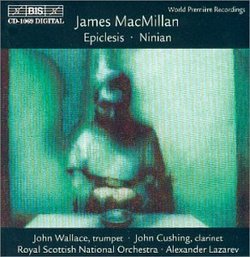The Miraculous in Antiphony
Thomas F. Bertonneau | Oswego, NY United States | 10/15/2000
(5 out of 5 stars)
"The careers of Peter Maxwell Davies (born 1934) and Kevin MacMillan (born 1959) make a useful comparative study. Davies, the elder of the two, came to maturity in a musical milieu still enamored of serialism; and although Davies early professed an admiration for Mahler, his music tended toward the dissonant and esoteric, even when he strove to write in a more public mode, as he obviously attempted in his Violin Concerto (1988), for Isaac Stern. Manchesterian by birth, Davies has long celebrated both the spiritual culture of the Orkney Islands, where he resides, and the austere evangelical character of the local archipelagic patron-saint, Olaf the Great. Scots by birth, MacMillan, like Davies, explores the spiritual character of the forms taken by Christianity in the North of England and in Scotland in the early medieval period. But - we now arrive at the difference - MacMillan belongs to a generation for whom serialism no longer functions as an unavoidable dogma; he remains free, therefore, to make use of a variety of means to constitute an identifiable musical language. He has done so in his "Triduum," a three-part orchestral commemoration of Easter consisting of a cor anglais concerto, a cello concerto, and a symphony. These works incoporate a full spate of instrumental innovations culled from composers as different as Mahler and Messiaen and combine them with Plain Song and old-fashioned (yet ever new) triadic harmonies. MacMillan brings these resources to bear on the two recent scores represented by the new CD from BIS: His "Epiclesis" (1993; revised 1996), a trumpet concerto; and his "Ninian" (1998), a clarinet concerto. Certain features of "Epiclesis" (Greek for "invocation") will bring to mind the Panufnik of "Sinfonia Sacra" (1964), especially the device of multiple trumpets sounding in antiphony from points without the orchestra; elsewhere, a bit incongruously, one might think of the Swede Jan Sandström's "Motorbike" Concerto. Incredibly, the thunder-sheet plays a role of thematic importance in the composition. When the climax arrives, the Plain Song "Adoro Te," which has been subliminally present all along, peals out. Even the dead must be moved. "Ninian" follows a program about the enigmatic missionary Nyn or Nynia who promulgated the Gospels and made miracles on the Scottish marches in the early Fourth Century A.D. The "Adoro Te" appears; so does a bird-call imitation from Richard Strauss's "Die Schweigsame Frau." Yet the impression is anything but one of dilettantish eclecticism and the overall effect is powerful. Truly miraculous stuff!"
MacMillan at his blazing best
Bruce Hodges | New York, NY | 07/02/2008
(5 out of 5 stars)
"BIS has now recorded a large number of James MacMillan's works, including this disc from 1999 with two highly imaginative concertos. MacMillan wrote "Epiclesis" (Greek for "invocation" or "prayer") for John Wallace, the trumpet soloist here, who gives the piece a hero's welcome with some thrilling playing. He begins with a fluttering motif while the orchestra quietly gathers force, eventually erupting with one of the composer's typical passionate outbursts. The first movement ends with the orchestra in a hymnlike chorale, while the trumpet returns to the opening's initial stutter. The second part is a wild clatter of rhythmic invention, laced by the composer's gregarious approach to percussion. But the ending is a marvel of stasis, as the soloist breathes a lonely figure into the air, while the ensemble holds an eerie chord underneath.
The clarinet concerto, titled "Ninian," refers to Nynia, saint of the Galloway region of Scotland, and is also performed by its dedicatee, John Cushing. It might be viewed as a vast study of metric shifts. It begins pummeling almost immediately, racing off with dramatic paragraphs for strings and brass, in a section called "The reiver and the bull." (Sometimes with MacMillan, I feel like I'm observing a huge fire-breathing beast, rearing up and destroying everything in its path.) The clarinet enters sounding almost lazy in comparison, before the orchestra quickly pushes it to greater extremes. Cushing's virtuosity is quite impressive throughout. Sections II and III are "The dream of Pectgils," and "A mystical vision of the Christ-child," respectively, and only increase the demands on the soloist, with the orchestra in fascinating displays of rhythmic invention and color.
Recorded by BIS with great clarity in Glasgow Hall, Scotland, the disc commands a wide dynamic range capturing all of MacMillan's complex effects. Whether the orchestra is at a hush or a barbaric roar, every detail registers with (sometimes) almost uncomfortable intimacy."
Challenging and Rewarding
kamus | United States | 03/31/2002
(4 out of 5 stars)
"These pieces by MacMillan confirm the impression that he is emerging as one of the vital composers of the 21st century. As with with Ades and Corigliano, his style is far ranging and eclectic, abstract and difficult at times, but always delivered with conviction and imagination. Some of the material, particularly in the trumpet concerto, makes demands upon the listener but as the title of this review indicates, he produces the goods. Other sections such as the second movement of the clarinet piece instantly draw the listener into a world of strange familiarity, beautiful and utterly fresh. At other times one delights at his wonderful sense of humour (as in the "klezmer" passages), something all to often absent from contemporary classical music.
A few minor performance problems in these difficult to perform works are the only barriers to a five star rating.
Hearing this music gives one faith that contemporary music is in able hands and that genius is far from being the exclusive product of earlier times."


 Track Listings (5) - Disc #1
Track Listings (5) - Disc #1